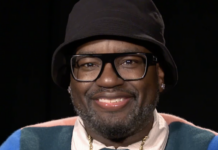 *Jamie Foxx plays wrongly-convicted Death Row prisoner Walter McMillian in Destin Daniel Cretton’s “Just Mercy,” set to arrive in theaters on January 10, 2020.
*Jamie Foxx plays wrongly-convicted Death Row prisoner Walter McMillian in Destin Daniel Cretton’s “Just Mercy,” set to arrive in theaters on January 10, 2020.
The emotional drama centers on world-renowned civil rights defense attorney Bryan Stevenson as he recounts his experiences as a young lawyer and details the case of condemned death row prisoner Walter McMillian.
In 1987, McMillian was “sentenced to death for the murder of an 18-year-old girl, despite a preponderance of evidence proving his innocence and the fact that the only testimony against him came from a criminal with a motive to lie,” per IMDB.com.
As noted by Deadline, “having experienced the incarceration of his own father, Foxx brought a deeply heartfelt perspective to the role,” the outlet writes in its exclusive Q&A with the actor about the film.
Below are excerpts from the conversation.
OTHER NEWS YOU MIGHT HAVE MISSED: Mike Hill Addresses Criticism of Cynthia Bailey’s Teen Daughter Living with Him in LA
 DEADLINE: How did you first get on board the film?
DEADLINE: How did you first get on board the film?
JAMIE FOXX: Michael B. Jordan called me. I’ve known Michael B. Jordan since he was tiny. If he ever needed anything I was always there, which is just a thing that I do. And in this situation, he called and said, “Listen, I would really love for you to take on this role.” He was so eloquent. I mean, whatever he was going to ask me I was going to say yes anyway. But when he told me about what it was… if you look at his body of work, when he did Fruitvale Station, I thought that was amazing because it allowed a narrative that he could always go back to, talking about what’s going on with us, some Black folk. Those stories that are so important. And then what he did in Black Panther was still that narrative of us feeling good about ourselves. And now, along comes Just Mercy with Bryan Stevenson. I said, “It’s beautiful that you have this that you can go to and let us feel good about something.” And I said, “I want to be a part of it.” And I was humbled by it. And then we started working.
DEADLINE: How was the experience of visiting Death Row in the past and of being in those cells for this film?
FOXX: The Death Row that I went to, San Quentin. You remember in Silence of the Lambs? When he looks at Jodie Foster and he goes, “You’ll do fine,” and you see that the minute that door closes, it’s a different world. The people that are behind those bars, not everybody’s innocent. This is the people that have done bad crimes.
The people that they hire to deal with those people are different. It’s not just an average correctional officer. These guys have backgrounds in psychotherapy, so you definitely feel the difference because you know it’s death. It’s people that are there for a reason. When I met the guy I was supposed to be playing at that time, he came in with shackles, two shotguns flanked him, it’s a lot different. That being said, the Death Row back then where these guys were [in Just Mercy], it was even more diabolical because the cells were right next to where they are being executed. So they can smell the smell of the burn. It was a torturous thing.
DEADLINE: Sadly, Walter has passed away, so how did you build a clear picture of him? Through Bryan? Through the family?
FOXX: I call it a blessing to be able to look at someone or hear a few things about them and start to wrap the skin around them. And if you look at Walter, we are from the same tribe. We have the same cheekbones, the diamond-shaped head, the haircut that he had, I had the haircut in the ’80s. There are pictures. I can show you we looked exactly the same. I know this sounds weird, but J.T. From Kool & The Gang has the same kind of head. That and then talking to Bryan and him explaining that Walter was just any Black man from the South that just wanted to do right. Then once he got into the prison, he was still trying to be a light for some of these guys. He had a great spirit. Then it was just finding the way he talked. Me being from Texas, man, when we talk it’s something different. And that was Destin, myself and Michael sitting in the room, finding out what’s the best way to approach that so it doesn’t come off caricature-like. And then finally, anybody will tell you the spirit of that person has to come visit you. So, you sit with your fingers crossed that Walter will step in at some point. And then once we started, Walter was there, Bryan was there, everything was there. And you just feel like, “Oh, here he is.”
DEADLINE: Did making this film change your politics around the death penalty at all?
FOXX: Well, I’ve never been for the death penalty because my father went to jail for seven years. They gave him a seven-year sentence for $25-worth of illegal substance. He got a chance to view the movie. Living in the South of Texas it’s common, so you don’t know how to really grasp it sometimes. But it’s interesting to see people going, “Oh.” Also too, I talked to a judge. He was a judge in Alabama and he quit. I said, “Why’d you quit?” He says, “I couldn’t take it anymore because we will pick up kids off the street, Black kids, 15 or 16 for nothing. Put them in the system.” I said, “Why?” He said, “Well, so we could have a lineup. So, if anything goes wrong in Pleasantville, go grab them kids, put them up.” And then when the jail is privatized, you go pick them kids up. You put them in the system. Because for every kid you have in there, if you meet your quota, you get a check.
So when you see people getting hauled off to jail, hey man, it’s about design, you know? The one thing that I hope out of this is that we don’t become fatigued. Because a lot of times people say, “Oh this, they’re at all the world’s against them again.” One government official said, “Hey, we gave you a Black president. What else do you need?” And you go, “Hey man, that’s great. That means we are walking in the right direction.”
I’ve always said this about America, our natural resource is freedom. And the great thing about America is the evolution of it. We got this wrong at one point in American history, we’re righting those things, and we continue to do it. Hopefully we understand that this is an ongoing thing and accept that this is a problem and then try to fix it because like Bryan Stevenson would say, “If we don’t acknowledge that these things are happening, then we can’t take steps in trying to correct it.”
Read the full interview here.
We Publish News 24/7. Don’t Miss A Story. Click HERE to SUBSCRIBE to Our Newsletter Now!





